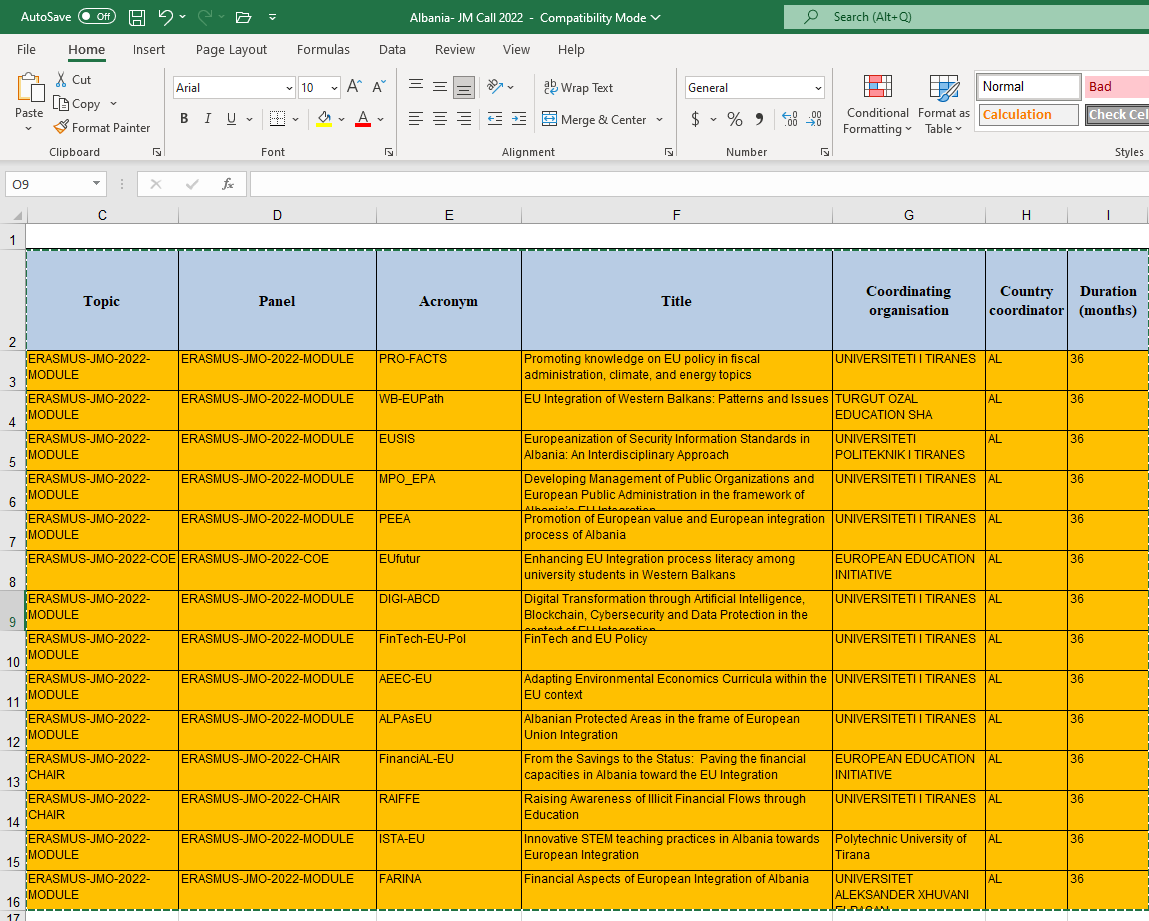JEAN MONNET ACTIONS IN THE FIELD OF HIGHER EDUCATION
The Jean Monnet Actions in Higher Education supports teaching and research in the field of European Union studies worldwide. By EU studies it is meant the study of Europe in its entirety, with particular emphasis on the EU dimension, from an internal but also from a global perspective. The scope of EU studies can be varied so long as the EU angle is explored. EU studies should promote active European citizenship and values and deal with the role of the EU in a globalised
world, enhancing awareness of the Union and facilitating future engagement as well as people-to-people dialogue. The Jean Monnet Actions also strive to function as a vector of public diplomacy towards third countries, promoting EU values and enhancing the visibility of what the European Union stands for and what it intends to achieve.
The objectives and criteria to apply for teaching and research are described below.
TEACHING AND RESEARCH
OBJECTIVES OF THE ACTIONS
The Jean Monnet “Teaching and Research” actions will:
- promote excellence in teaching and research in the field of European Union studies worldwide;
- foster dialogue between the academic world and society, including local and state level policy-makers, civil servants, civil society actors, representatives of the different levels of education and of the media;
- generate knowledge and insights in support of EU policy-making and strengthen the role of the EU within Europe and in a globalised world; reach out to a wider public and spread knowledge about the EU to the wider society (beyond academia and specialised audiences) bringing the EU closer to the public.
The actions also strive to function as a vector for public diplomacy towards third countries not associated to the Programme, promoting EU values and enhancing the visibility of what the European Union actually stands for and what it intends to achieve.
SETTING UP A PROJECT
The Jean Monnet “Teaching and Research” must take one of the following forms: Modules, Chairs, Centres of Excellence
- Modules are short teaching programmes or courses in the field of European Union studies at offered at a higher education institution. Each Module has a minimum duration of 40 teaching hours per academic year for a duration of three years. Modules may concentrate on one particular discipline in European studies or be
multidisciplinary in approach and therefore call upon the academic input of several professors and experts. They can also take the form of short specialised or summer programmes. - Chairs are teaching posts with a specialisation in European Union studies (as described above) for university professors for a duration of three years. A Jean Monnet Chair is held by only one professor, who provides the minimum of 90 teaching hours per academic year. The Chair may also have a team to support and enhance the activities of the Chair, including the provision of additional teaching hours.
Jean Monnet Centres of Excellence are focal points of competence and knowledge on European Union subjects. They should gather the expertise and competences of high-level experts aiming to at develop synergies between the various disciplines and resources in European studies (as described above) as well as at 351 creating joint transnational activities, they also ensure openness to civil society. Jean Monnet Centres of Excellence have a major role in reaching out to students from faculties not normally dealing with European Union issues as well as to policy makers, civil servants, organised civil society and the general public at large. Jean Monnet beneficiaries (modules and Chair holders as well as Centre of excellence participants) are requested to organise activities and events that shall ensure openness to policy makers, civil servants, civil society and the general public at large.
For more specific details refer to Erasmus+ Programme Guide 2022: https://erasmus-plus.ec.europa.eu/sites/default/files/2022-01/2022-erasmusplus-programme-guide-v2_en_0.pdf
Jean Monnet Results 2022
The JeanMonnet projects won by Albanian universities are different.
- The University of Tirana has won 7 “JM MODULE” projects and 1 “JM CHAIR” project;
- The Polytechnic University of Tirana has won 2 “JM MODULE” projects;
- The European University of Tirana won for the first time a “CENTER OF EXCELLENCE JM” project and 1 “CHAIR JM” project;
- “Aleksandër Xhuvani” Elbasan University has won 1 “JM MODULE” project
- Epoka University has won 1 “JM MODULE” project.
Jean Monnet selection Results 2024
We are pleased to share with you the results achieved by Albanian HEIs in the selection process for the ‘Call for Proposals 2024’ under the Jean Monnet program!
The Albanian Erasmus+ Office would like to congratulate all participants on their hard work and wishes you success in the implementation of the projects


